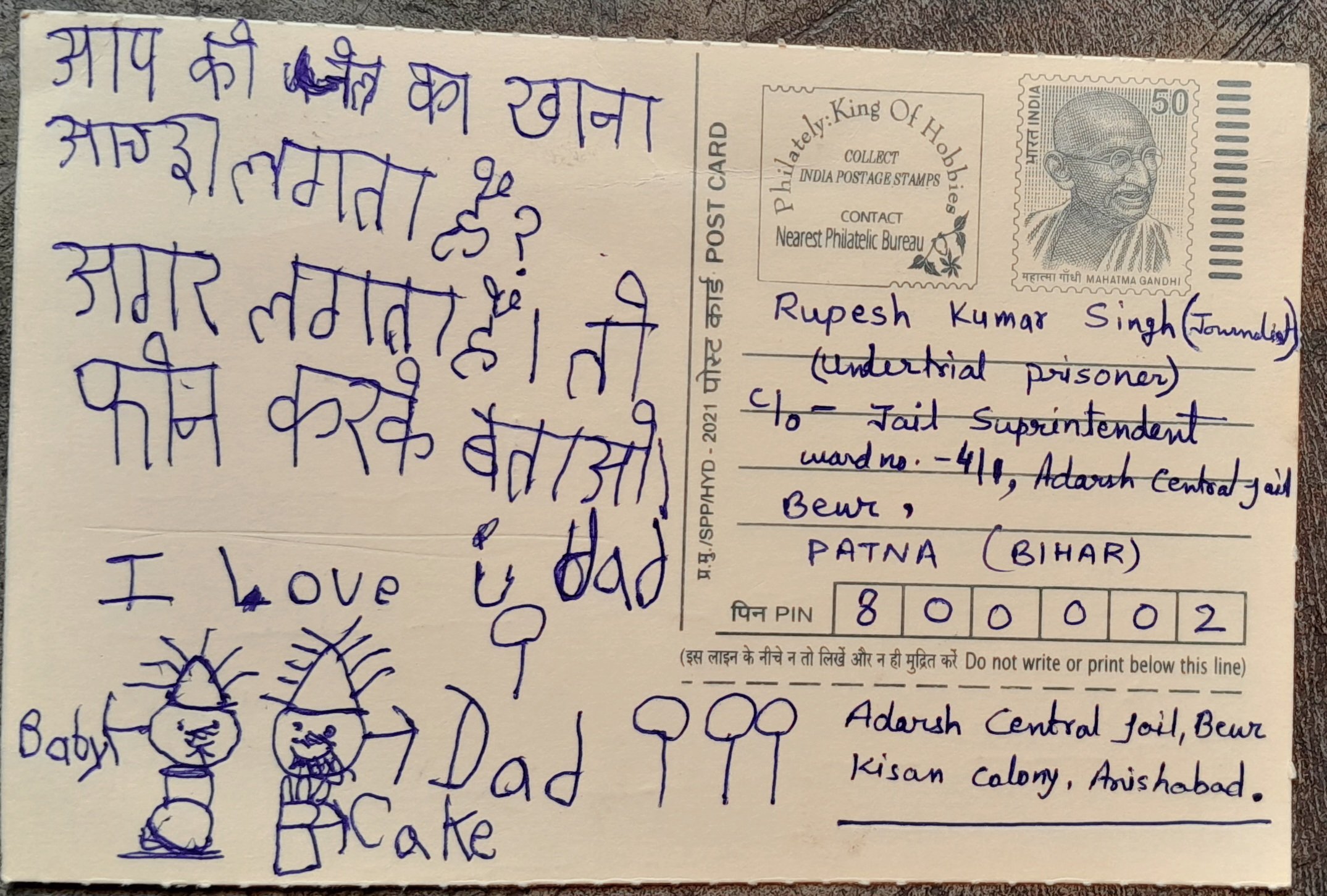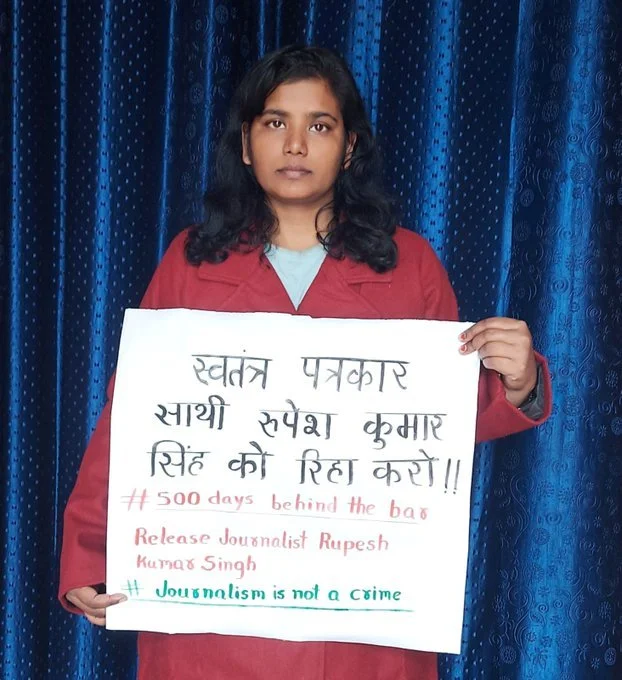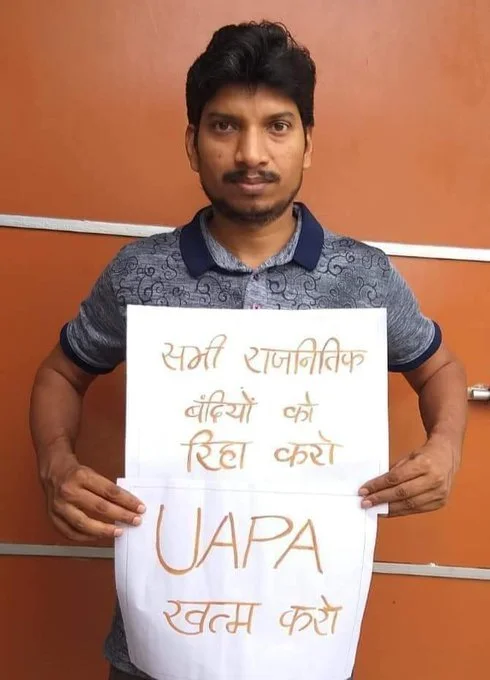“I won’t write your lies as truth”
The Courage and Determination of Journalist Rupesh Kumar Singh
An InSAF India Long Read
On 11 April 2025 morning, Rupesh’s 1,000th day in prison, during the phone mulaqat, he recited this poem to his partner Ipsa.
Rupesh Kumar Singh is a journalist from the central-eastern state of Jharkhand, India. Arrested on 17 July 2022, he completed 1,200 days behind bars as an undertrial by the end of October 2025 . Rupesh has been accused in five cases, all of which link him to “Maoist activity” [1], and alongside other criminal laws, implicate him under the draconian anti-terrorist law, the Unlawful Activities (Prevention) Act, 1967 (UAPA). He has already spent three years in prison awaiting the completion of trials. Previously, in 2019, Rupesh had been released after spending 6 months in prison also on allegations of “Maoist activity”. (For Endnotes, scroll to the end.)
Rupesh began working as a Hindi-language journalist in 2013. His work has focused on the challenges faced by marginalized communities in Jharkhand and its neighbouring state of Bihar. His work especially addresses the systematic oppression and human rights violations faced by the Indigenous Adivasi communities in this region.
He has contributed to a wide range of publications and digital media platforms including The Wire Hindi, Jan Chowk, Media Vigil, Gauri Lankesh News, Janjwar, and Bhadas4Media.
As an independent journalist with over a decade of experience in grassroots journalism, Rupesh also routinely appears as an invited guest and expert on various media platforms. Until his incarceration he would regularly post video and textual news content on his own digital media channels on Twitter/X, Facebook and YouTube, which have a significant following.
Rupesh’s systematic incrimination in multiple cases one after the other, and often on flimsy and poorly corroborated charges, clearly point to state repression for his pro-people journalism. Through his journalism, he has been a vocal critic of the corporates operating in the state of Jharkhand and of the state support that they enjoy, including militarization and attendant human rights violations by the state armed police forces.
_____________________________
Watch | Was Independent Journalist Rupesh Kumar Singh Arrested for His Reportage? By Sumedha Pal, The Wire, 19 July 2022.
Rupesh Singh : The Journalist jailed for reporting the Uncomfortable truth, By Mohammad Sartaj Alam, Rana Ayyub’s Newsletter, 7 August 2022.
______________________________
Rupesh’s second arrest in 2022, closely followed his whistleblowing reportage on the detrimental impacts of industrial pollution on the lives of local people of Giridih district in south Jharkhand. Along with his family, he became a potential target of surveillance through Pegasus spyware that was illegally planted on three of their mobile phone numbers. In 2021, Rupesh became a petitioner in the Supreme Court case on the Pegasus Spyware Probe, demanding investigation into the Government of India’s use of this spyware on journalists, activists and public officials. The Government of India, has consistently refused to cooperate with investigation and or engage further on this matter, despite admitting in the Parliament that it was aware of the use of Pegasus to target some users.
Police action and the endless cycle of bail applications
Rupesh’s first arrest on 4 June 2019, was an illegal abduction while he was travelling from Ramgarh to Aurangabad with two other people. For close to two days, the three of them were kept in illegal custody by the Bihar Police. On 6 June, the police officially arrested them on charges of “Maoist activity” and showed recovery of explosives from the vehicle in which they were travelling. Rupesh and his co-accused denied these claims saying that the police had planted explosives in their vehicle. After spending six months in prison, they qualified for a default bail due to delays in filing of the chargesheet, and were released in December 2019. During his time in prison, Rupesh read and wrote as much as possible, within the constraints imposed on him by the prison authorities.
On being released from prison in December 2019, Rupesh began working on his jail diary, which was published in 2020 as Kaidkhaane ka Aaina. The jail diary exposes the fake charges imposed on Rupesh and his co-accused, alongside providing an intimate glimpse into everyday prison life. His writings reveal the replication of the ugly social (caste) hierarchies of Indian society inside prisons and highlight how inequalities and injustices towards minority communities are reproduced in everyday prison life.
Rupesh’s second arrest took place on 17 July 2022, following a nine-hour police raid at his home in Ramgarh district of Jharkhand. 10 months later, while he was in prison, his home was raided a second time by India’s National Investigation Agency (NIA; which is under the Union Home Ministry).
During this raid, his spouse’s mobile phone was also confiscated, indicating the state’s attempts to falsely incriminate her as well. After his rearrest in 2022 in the Saraikela-Kharsawan case, his bail applications were denied by the trial court and the High Court. In January 2025, Rupesh and his family suffered another setback when his bail application in this case was further denied by the Supreme Court. Notedly, Rupesh has secured bail in the Bokaro case from the High Court and the Chaibasa case from the trial court. He is yet to apply for bail in the NIA case.
Repression and resistance in prison
Since his arrest three years ago, Rupesh has been transferred across prisons four times, and has been incarcerated in four different prisons across the two states of Bihar and Jharkhand. Each prison transfer is marked by unaccounted violence in the form of stressful relocation to an unknown and possibly unsafe environment, loss of social connections built in the old prison, and in particular, threats and antagonism from the new prison’s officials.
______________________________
India: arrest & ill-treatment of HRD & journalist Rupesh Kumar Singh (joint communication), By UN Special Rapporteur on Human Rights Defenders, 05 January 2023.
______________________________
In January 2024, Rupesh was transferred to the Shaheed Jubba Sahni Central Jail in Bhagalpur district, Bihar. Since the trials for all his cases are being conducted in different cities, most of them far away from Bhagalpur, he has not been physically presented in court for over nine months, further cutting him off from the world outside, and depriving his family and lawyers of a physical meeting, who earlier were at least able to meet him at the court hearings in the past.
In spite of all of these adversities, Rupesh and his family are persisting in holding the prison administration accountable and highlighting the corruption that runs deep in the carceral ecosystem. Rupesh also continues to petition the local authorities for improving living conditions inside prison, demanding better food, healthcare, better facilities and hygiene, and dignified treatment for himself and his fellow inmates. From prison, he consistently raises his voice against the violence and degradation faced by incarcerated people, through petitions to India’s national and state human rights commissions, to judges in courts, and to senior bureaucracy. He has also organized prisoners’ protests against injustices inside prison, including hunger strikes.
____________________________
Watch | 'Kept in Isolation, Given Substandard Food': Wife of Jailed Jharkhand Journalist, By Sumedha Pal, The Wire, 5 August 2022.
____________________________
3 years of incarceration of Rupesh Kumar Singh: His wife Ipsa shares their ordeal [In Hindi], By Ipsa Shatakshi, The Mooknayak, 18 July 2025.
____________________________
Over the last three years, Rupesh has also continued his education. He has read 104 books. He has completed a distance learning master’s degree in History through the Indira Gandhi National Open University (IGNOU) and is currently pursuing a degree in Journalism and Mass Communication. The prison authorities have denied him access to computers and camera for the practical assignment. Rupesh is interested in pursuing a master’s degree in Hindi Literature as well, but is unable to start at the moment due to financial constraints. He is also planning to prepare for the UGC NET examination.
Due to the persistent exposure to harsh living conditions of incarceration and the lack of access to essentials for a healthy life, Rupesh’s health has deteriorated considerably over the last three years. Rupesh has developed multiple disorders including extremely high cholesterol and triglycerides, and severe pain in his back and legs. The prison administration drag their feet on medical follow-ups. It was after much delays that a hospital visit was arranged for the required medical examination. All of Rupesh’s health conditions have developed in the prison due poor nutrition and a lack of physical activity. While he has received some treatment, the risk of permanent damage to his health remains.
India’s carceral state: one imprisonment, numerous victims, endless adversities
Rupesh’s extended family, especially his spouse Ipsa Shatakshi and their son who was only five years old at the time of his father’s incarceration, have been as much victims of his unjust incarceration as Rupesh himself. At the time of Rupesh’s arrest, Ipsa worked as a school teacher in their home town. In Rupesh’s absence after his arrest, the responsibilities of the upkeep of their home and the upbringing of their child completely fell on her. This was especially hard as Rupesh and his son had been very attached.
Ipsa also became responsible for coordinating legal aid and facilitating a public campaign for Rupesh’s release from prison. To cope with these additional responsibilities, she had to leave her teaching job. For a while she earned a living by providing tuitions to children at her home. But as Rupesh was incriminated in additional cases and was also successively transferred across multiple prisons, her commitments towards providing legal and remote care to Rupesh increased manifold. Eventually the home tuitions could not be sustained anymore. Now the family has lost two incomes, first Rupesh’s and then Ipsa’s.
The incarceration and various uncertainties that accompany it have adversely impacted mental health and well-being of Rupesh’s entire family. The family has faced harassment by the police and the investigative agencies through their demands for information and interrogations. The family also continues to face the social stigma that comes with incarceration of a loved one, especially in Rupesh’s case where the allegations levied are extremely grievous. Moreover, both Rupesh and his son are deprived of each other’s presence in their lives and years of childhood missed out.
In terms of their everyday life, Rupesh’s incarceration is a constant preoccupation in the minds and lives of his family, especially Ipsa and his son who now live alone. They have witnessed to Rupesh’s persecution and the extra-judicial practices of the police and investigative agencies from up close. Ipsa constantly dreads hearing more bad news about Rupesh, anticipating more fake cases or false charges. They are also continuously anxious about his well-being in prison, fearing physical and psychological harm to Rupesh at the hands of prison officials.
Holding out on their own: Our collective shame
In January 2024, Rupesh was transferred for the third time to the Central Jail in Bhagalpur. Since Bhagalpur is over 350 km away from their hometown, Ipsa was unable to regularly visit him in prison. The costs for overnight travel to Bhagalpur were high in addition to poor public transport connectivity. Thus, Ipsa preferred to save money, and instead sent essentials for him through extended family who live closer to the jail. There were possibilities of e-visitation through video conferencing, but those meetings were somewhat arbitrarily scheduled and were frequently impacted by technological glitches. Phone calls barely lasting five minutes were only allowed about three to four times a month, which do not allow for proper exchange of updates or important legal information, let alone exchanges about their well-being.
____________________________
“This system breaks the body when it cannot break the spirit” — Ipsa Shatakshi on her jailed husband, journalist Rupesh Kumar Singh, By SABRANG INDIA, 24 October 2025.
“Feeling abandoned, where will we go now,” says wife of jailed journalist Rupesh Kumar after SC rejects bail plea, By Nikita Jain, Maktoob Media, 30 January 2025.
____________________________
The recent deterioration in Rupesh’s health over the last few months, has been a huge source of anxiety for Ipsa and the rest of the family. She has been seeking legal interventions and is petitioning the prison administration to take prompt actions regarding his health including ensuring medical care and adequate nutrition for her partner. In response to her advocacy and the interventions made by Rupesh’s lawyers, in the last week of September 2025, Rupesh was transferred back to Patna’s Beur Central Jail, where he was incarcerated before he was sent to Bhagalpur as punishment in January 2024. Rupesh’s transfer back to Patna after 20 months is welcomed by him and his family, especially because being located in Patna will allow him to regularly attend his ongoing trial there. However, the family’s struggles towards ensuring Rupesh a healthy and dignified life in prison in Patna continue, including his access to the required medical care and adequate nutrition.
Nevertheless, Ipsa and her family has shown exceptional courage and resourcefulness in coping with Rupesh’s unjust imprisonment over the last three years. In addition to fulfilling her obligations towards her family and Rupesh, Ipsa has completed the first year of a law degree, with the hope that she will be able to support the legal battles of her partner. She is also an activist, a writer, and a poet and has published on multiple platforms. With support from her sister Ilika Priy, who is a practising lawyer and widely published writer in her own right, Ipsa has managed to create a campaign for Rupesh’s release. In 2025, Ipsa published her first collection of poems in Hindi entitled ‘Ishq Aur Sangharsh’. Some of the poetry in the book also draws on her own and her family’s experiences with Rupesh’s politically motivated incrimination and incarceration.
Call to action: Amplifying voices in solidarity
Rupesh Kumar Singh’s Prison Diary कैदखाने का आइना: जेल डायरी [Kaidkhaane Ka Aaina: Jail Diary], 2020, Pralek Prakashan Pvt. Ltd
Ipsa Shatakshi’s Collection of Poems इश्क और संघर्ष [Ishq Aur Sangharsh], 2025, New World Publication
Profile of Rupesh Kumar Singh, Committee to Protect Journalists (CPJ), 2024.
Ground Report: Lakhs of lives stifled between smoke and ashes (english translation) by Rupesh Kumar Singh, first published in JanChowk, 15 July 2022. This article was among the last ones reported by Rupesh before his current incarceration. It paints a disturbing picture of the rampant pollution in Giridih district of Jharkhand, as companies spew out waste material and water with no regard for any environmental regulations (many of which have even been relaxed since then) or environmental degradation. The administration looks askance, revealing one instance of the increasing and spreading paralysis of justice-based governance in India.
Adivasi & Human Rights Violations: Journalist Rupesh Kumar Singh speaks in JNU (english translation): this is an edited translation of the talk given by Rupesh in spring 2022 at Jawaharlal Nehru University in which he elaborated through several examples the colonialism of the Indian state evident in the militarization of Adivasi areas of Jharkhand as part of Operation SAMADHAN. His warnings from that time are coming true as at the time of publication (January 2026), these regions have been in the throes of the next generation Operation Kagar of the Indian State that is deepening and escalating the existential danger to Adivasi existence in India — see our series ‘Deadline or Death Sentence .
Endnotes
[1] Maoist activity refers to the Naxalite-Maoist insurgency that originated among landless peasants in the Naxalbari area of North Bengal in 1967. While the original revolt of the marginalized rural masses against the Indian government was severely repressed by the state, the movement continued to live under various iterations of the Communist Party of India (Marxist-Leninist) (CPIML). In the 1980s, the Naxalites took their movement to the mineral-rich belt in central-southern-eastern India that is home to India’s Indigenous Adivasi peoples, and where it has remained centred for the past 40 years. In 2004, the CPI (M-L) People's War and the Maoist Communist Centre merged to form ‘Communist Party of India (Maoist)’. Since then, Naxalite and Maoist have been used interchangeably. In the present context, the Indian state is known to often misuse and impose the Maoist label on journalists, activists, lawyers, academics etc. to criminalize their critical and dissenting voices. Among countless such cases, one prominent case is the Prof. GN Saibaba and his co-accused, all of whom were acquitted after a gruelling 10 years in prison.
[2] UGC NET – University Grants Commission National Eligibility Tes). This qualifying exam is conducted by the University Grants Commission (UGC), which is the statutory body charged with regulating higher education institutions in India. Through the National Eligibility Test, the UGC provides credentials necessary for teaching in Indian higher education institutions.
[3] The deterioration of health of undertrials is an important issue – many individuals who were first incarcerated in relatively good health, but given their long-term exposure to inhuman physical and mental conditions in Indian prisons, we are witnessing case after case of deteriorating health. To learn more see: Vernon Gonsalves. Some personal reflections on prison medical care. Indian Journal of Medical Ethics, 29 March 2024.











